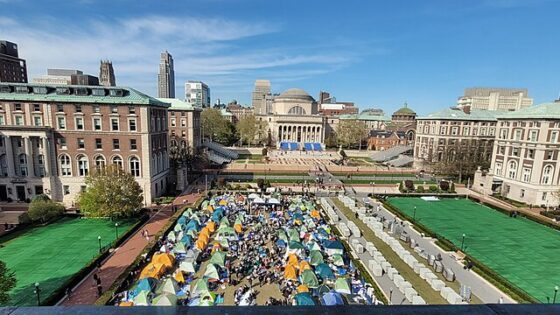http://www.washingtonpost.com/wp-dyn/content/article/2007/12/15/AR2007121501553_pf.html
NEW YORK — When the head of Columbia University suggested that free speech was banned in Tehran, Iranian President Mahmoud Ahmadinejad not only disagreed, he also invited Lee C. Bollinger to come and see for himself.
The retort won Ahmadinejad applause on the New York campus and accolades back home. For Bollinger, the sharp remarks he made in introducing Ahmadinejad were meant to kick off a lively debate. But three months later, they have kept Columbia roiling.
The remarks, faculty members said in interviews, have exacerbated an already tense climate that is increasingly pitting Muslim and Middle East studies professors against positions held by Jewish colleagues, particularly on the issue of tenure for two Arab professors.
“There have been an accumulation of events since Bollinger arrived that have people riled up. I have never seen a situation quite like this one, and I’ve been here for 32 years,” said Richard Bulliet, a professor of Islamic studies who helped negotiate Ahmadinejad’s appearance at the university.
A new source of angst is Bollinger’s refusal to take up Ahmadinejad’s invitation and his ban on official visits to Iran by Columbia faculty members.
Middle East studies professors remain furious over Bollinger’s handling of Ahmadinejad’s visit. More than 100 faculty members signed a letter protesting Bollinger’s leadership. And in closed-door meetings, some of them have accused him of pandering to donors, selling out Middle East scholarship and embarrassing the Ivy League institution.
At first, much of the anger was directed at Bollinger’s presentation, which was seen by some faculty members as supportive of the Bush administration’s tough stance against Iran. At issue was Bollinger’s assertion that Iran has been behind terrorist attacks against U.S. troops in Iraq.
“The President has publicly taken partisan political positions concerning the politics of the Middle East, without apparent expertise in this area or consultation with faculty who teach and undertake research in this area,” the group wrote last month.
But behind the latest bout of anger is a feeling among group members that Bollinger is not being supportive of Arab and Muslim professors.
“There are people on the faculty who feel they are fighting against an administration that they really disagree with on all kinds of fundamental issues,” said Gary G. Sick, an Iran expert at Columbia, who served on the National Security Council under Presidents Gerald R. Ford, Jimmy Carter and Ronald Reagan. “Ultimately, this is about tenure.”
In response, a smaller, rival faction, which includes a large number of Jewish faculty members, wrote its own letter in defense of Bollinger and urging careful reviews of tenured positions for two Palestinian professors. Among those who signed the letter was Elizabeth Midlarsky, who found a swastika painted on her door this fall. (SPME Editor’s note: This action was initiated by the leadership of the SPME-Columbia University Chapter)
Bollinger cited security and other concerns in declining Ahmadinejad’s invitation and in banning faculty members from accepting Iranian invitations on behalf of Columbia.
“I have an interest in going,” Bollinger said in an interview, “but I decided that it’s just not appropriate to send anyone now.” Bollinger, a free-speech scholar and lawyer, was president of the University of Michigan before he took the helm at Columbia in 2002. He also serves on the board of directors of The Washington Post Co.
Sick has been particularly harsh about Bollinger’s handling of the Ahmadinejad visit and on other free-speech issues that have affected the Middle East Studies Department. In 2004, the school was rocked by accusations from a group of radical Jewish students of intimidation by Middle East language professors. Bollinger appointed a commission to study the accusations but did not give an opinion on the allegations, which many faculty members said were unjustified.
“He obviously wasn’t happy that Ahmadinejad was invited,” Sick said. “But a day before the debate, Bollinger put out a message to the faculty saying that the visit highlights our belief in freedom of speech and that’s why Ahmadinejad was invited. But then he delivered an extreme and unnecessarily provocative attack on Ahmadinejad.”
Several professors suggested that Bollinger’s stinging introduction, in which he called the Iranian leader a cruel dictator, was designed to impress City Council members who were weighing the university’s controversial plan to expand into Harlem. A number of council members had lambasted Bollinger for allowing Ahmadinejad on campus and had said that they would retaliate. But in interviews, these city lawmakers said they did not consider the event when they voted to approve the expansion plan last month.
Bollinger has staked his legacy on the expansion plan, which is in need of millions of dollars in capital investment and is dependent on negotiations with community leaders. New York state has said that it might use the power of eminent domain to claim land from the neighborhood for Columbia, but it is not clear whether that will happen.
Bollinger said that the effects of the Ahmadinejad visit are waning and that he is eager to put it behind him. “I am taking faculty concerns seriously,” he said, adding that tenure cases are not being influenced by outsiders.
Staff researchers Julie Tate and Madonna Lebling contributed to this report.




